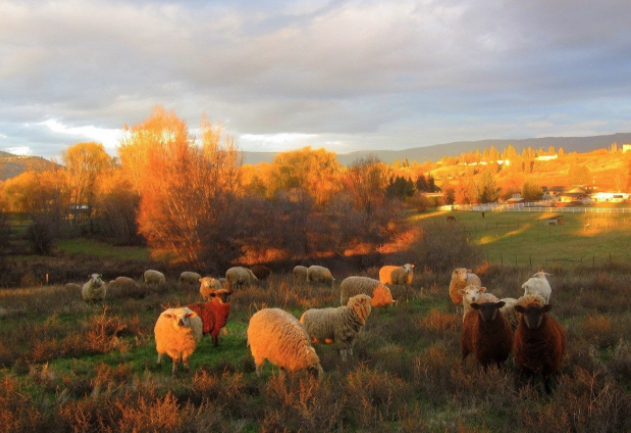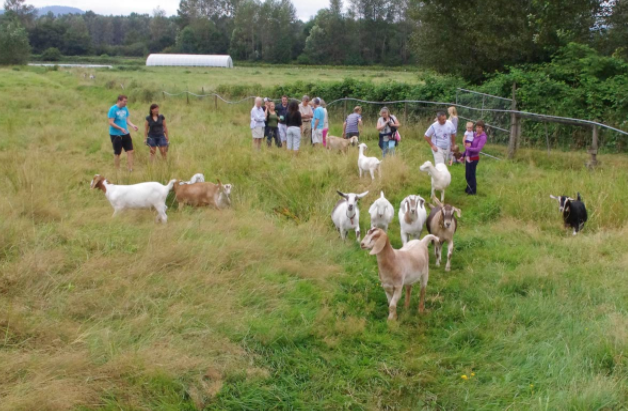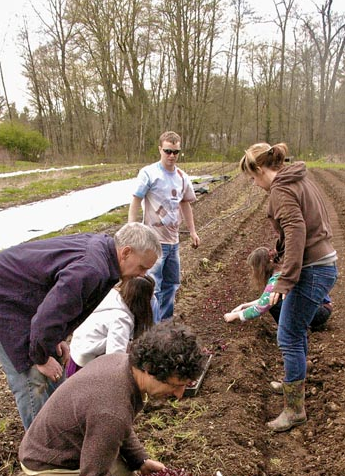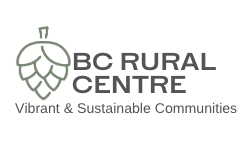
BC’s FoodLands Cooperative Launches

courtesy Foodlands Cooperative
FarmFolk CityFolk’s Foodlands Trust Project has been approved by the BC government. We are officially the Foodlands Cooperative of BC. Its founding members — FarmFolk CityFolk Society, Vancity Community Foundation, Fraser Common Farm Cooperative, and the BC Farmer’s Market Association — will be joined by other advisory members to form the first board of directors of the new land trust cooperative.
The Foodlands Cooperative of BC is a member-powered provincial cooperative that secures and holds land in trust while facilitating capacity building of community groups to make land accessible and manage it for food provisioning. The Foodlands Cooperative upholds and demonstrates the public and community interest for sustainable land use and the protection and utilization of food-providing lands across BC.
Why A Foodlands Trust
Farmland in British Columbia is scarce. Less than 3% of the province’s land area has an agricultural capability allowing for a range of crops to be produced. The real estate value of farmland is at an all-time high. In 2016, the average cost per acre in BC was $151,000, with land in the heavily populated areas much higher (Cooper, 2017).
Farming and food production are the foundation of our local food system, and key contributors to regional economies, retention of natural areas, provision of ecosystem services, and community well-being. There is growing public awareness and enthusiasm around building a sustainable local food and agriculture system in BC.
In British Columbia we face significant challenges related to secure and affordable land access for food production. Foodlands access refers to the ways in which land is secured for food provisioning and requires that:
- Land is available (especially to new entrants) for food provisioning;
- Land is priced at its agricultural value and is affordable to food provisioning enterprises;
- Duration and security of tenure meets the needs of those producing food;
- Retiring food producers are financially able to transfer their assets to incoming generations.
New entrants face a diversity of challenges and several recent studies confirm that the cost of foodlands are one of the most significant barriers to establishment. Aging, established producers will be facing a record number of farm and foodland transfers over the coming decades, and in many cases, have no family member waiting to take over the land. While BC’s Agricultural Land Reserve preserves foodlands, there is no assurance it will be used for food production.
The community-based Farmland Access Research Project, a partner project of UBC’s Faculty of Land and Food Systems and FarmFolk City Folk’s Community Farms Program, has identified an urgent need for innovative land access and governance models especially for a new generation interested in building alternative and sustainable food networks that utilize environmental best practices to enable regional food security.
In partnership with leaders in the agricultural and land trust sectors, the Foodlands Cooperative of BC serves a complementary function to BC’s Agricultural Land Reserve by facilitating access to farming and foodlands. FLCBC addresses the problematic rising cost of land and non-farm uses of foodland in BC by placing land in trust and ensuring BC’s foodlands remain in production.
The support for a trust has been articulated across the province through various agricultural plans (The Corporation of Delta), food system action plans (Metro Vancouver), economic development strategies (District of North Saanich), frameworks (Vancouver Island Coast) and council reports (District of Saanich). The idea has been further endorsed by nine local governments (Cities of Coquitlam, Richmond, New Westminster, North Vancouver, Surrey, Port Moody, Bowen Island Municipality) as one of the opportunities for collaborative action outlined in the Metro Vancouver 2016 Regional Food Systems Action Plan indicating that the need is critical and that through collaborative efforts we can leverage cross-sectoral interest and resources.

courtesy Foodlands Cooperative
What the Foodlands Co-op Does
- Accept donations of foodlands to hold in trust and make available for food production
- Establish and manage long-term secure lease agreements with people who commit to active and sustainable food production on the land
- Provide resources and support to community groups seeking to place land in trust and/or form land cooperatives to access farmland
- Facilitate formation of community groups (societies and cooperatives) that will manage and support land held by Foodlands
- Provide informational resources
Depending on the needs and priorities of the landowner, the land itself and current capacity, the Foodlands Co-op can deploy a variety of tools to protect valuable agricultural lands.
Interested? The first step is to send them an email and share the story of you, the land, and your vision. Foodlands will follow up with additional questions and a phone call.
Mission & Purpose
Mission
The Foodlands Cooperative of BC (FLCBC) is a registered society founded in 2017 with the mission to secure and holds land in trust and promote the protection and utilization of food providing lands across BC. FLCBC works with landowners, farmers, local communities and leaders in the agricultural and land trust sectors to develop and support community foodlands models and build healthy, local food systems. FLCBC recognizes the diversity of food harvesting systems, acknowledges the colonial history of agricultural land policies, and participates in a dialogue between farmland protection and access initiatives and Indigenous land rights.
FLCBC upholds and demonstrates the public and community interest for sustainable land use, and is at the forefront of encouraging alternative forms of land ownership to ensure BC’s agricultural lands remain in production in perpetuity.
The Purposes of the Foodlands Cooperative of BC are:
- To secure, protect and steward land that is to be used for the promotion of sustainable agriculture and local food provisioning for the benefit of communities in British Columbia, while recognizing, respecting and including indigenous food systems;
- To advance education by supporting public workshops, training, and mentoring programs related to sustainable agriculture and local food provisioning for the benefit of communities in British Columbia.
History
Between 2006-2012, The Land Conservancy of BC (TLC) played an important role in farmland acquisition in BC, partnering with FarmFolk CityFolk (FFCF) in the creation of a Community Farms Program to manage land. In 2013, TLC, suffering significant financial difficulties, ceased acquiring land, resulting in a clear and pressing need to create a new land trust. FarmFolk CityFolk partnered with the Capital Region Food and Agriculture Initiative Roundtable (CRFAIR) and UBC’s Centre for Sustainable Food Systems, funded by the BC Real Estate Foundation, to identify feasible models for a provincial body to hold farms and foodlands. The Farmland Access Research Project, work found that most existing trusts in BC hold land for conservation purposes, and those that hold active farmland are geographically limited in scope and resources. A conclusion reached was that a provincial trust would have greater reach, capacity, and impact.
Based on the research, each organization decided to focus on distinct but complementary strategies for holding farms and foodlands. CRFAIR is collaborating to create a local government trust for land located in the Capital Regional District. FarmFolk CityFolk incubated and stewarded the formalization of the Foodlands Cooperative as a provincial, non-governmental, community-based land trust.
Dialogue with the Working Group on Indigenous Food Sovereignty, led to changing “farmland” to “foodlands,” which recognizes the diversity of food harvesting systems, the colonial history of agricultural land policies, and further opens a dialogue between and across communities and initiatives around land access and Indigenous land rights.
A Resource Guide for Co-operative Development in British Columbia
Cooperatives are an effective alternative for land ownership.
Cultivating Co-ops is a useful guide that outlines what a cooperative is, and what kinds of co-ops exist. It also describes the steps to take in order to develop a cooperative and help to connect you with further resources.
You may photocopy or reproduce parts of this booklet for your research and to help your group. However, the rights holders request that you cite the source.
For addition information on cooperatives go to the BC Cooperative website.
For more information on innovative approaches to food production, visiting our Agriculture page.
Here’s a Country Life article on the Foodlands Cooperative.
